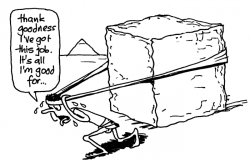Invisible power
 While it may be less visible, hidden power still assumes that people are aware of and are able to articulate their grievances. These can be investigated by looking outside the formal and public arenas of decision making and searching for the voices of discontent which are excluded from public view.
While it may be less visible, hidden power still assumes that people are aware of and are able to articulate their grievances. These can be investigated by looking outside the formal and public arenas of decision making and searching for the voices of discontent which are excluded from public view.
However, invisible power goes a step further. It involves the ways in which awareness of one’s rights and interests are hidden through the adoption of dominating ideologies, values and forms of behaviour by relatively powerless groups themselves. Sometimes this is also referred to as the ‘internalization of powerlessness’ in a way that affects the awareness and consciousness of potential issues and conflicts, even by those directly affected. Read more about invisible power or read the case studies in the resources section of this site.
 In this form of power, people may be unaware of their rights, their ability to speak out, and may come to see various forms of power or domination over them as ‘natural’, or at least unchangeable, and therefore unquestioned. Poor people, for instance, may accept their circumstance as the status quo even in the face of inequalities around them, internalizing dominant explanations of poverty that tell them poverty is ‘their fault’ rather than a systemic problem. Paulo Freire referred to this as the ‘culture of silence’, resulting from the internalization of oppression. Other people have challenged this view, and with it the concept of ‘false consciousness’.
In this form of power, people may be unaware of their rights, their ability to speak out, and may come to see various forms of power or domination over them as ‘natural’, or at least unchangeable, and therefore unquestioned. Poor people, for instance, may accept their circumstance as the status quo even in the face of inequalities around them, internalizing dominant explanations of poverty that tell them poverty is ‘their fault’ rather than a systemic problem. Paulo Freire referred to this as the ‘culture of silence’, resulting from the internalization of oppression. Other people have challenged this view, and with it the concept of ‘false consciousness’.
Strategies for challenging invisible power involve approaches like awareness raising, adult education, participatory research to validate peoples’ own knowledge, uses of the media and popular communication methods to challenge dominant stereotypes and discourses, changes in approaches to schooling and socialization, as well as many others. To find out more about action go to the strategize and act pages or view the Power Matrix handout by Just Associates (see related resources).
But hidden forms of power also can involve more hidden forms of action as well, in which people resist domination and control through less public ways. Read about resistance as hidden power.

